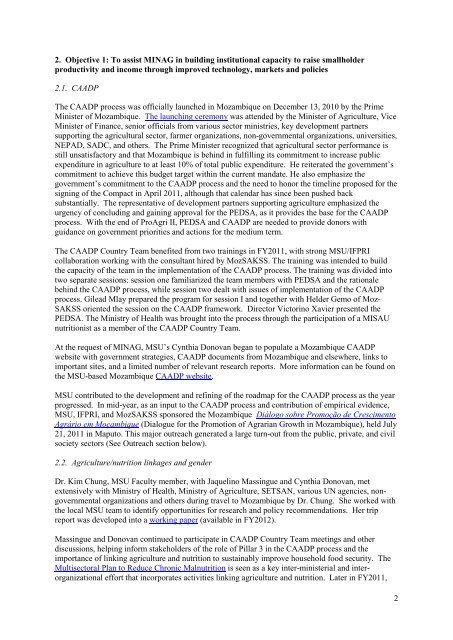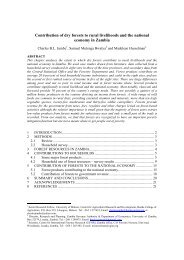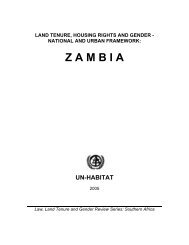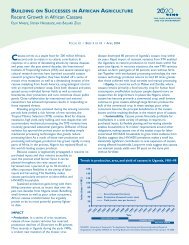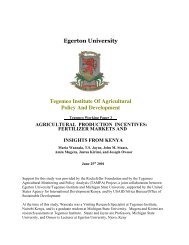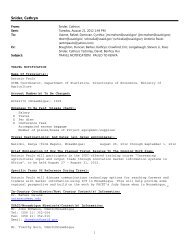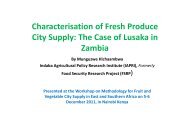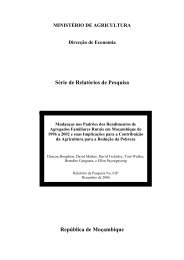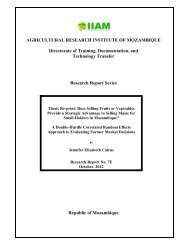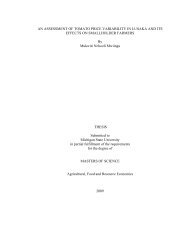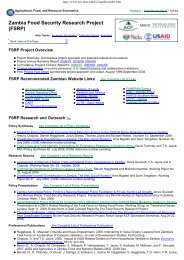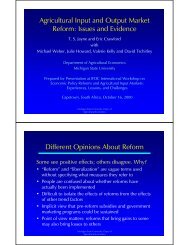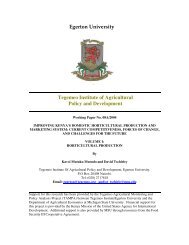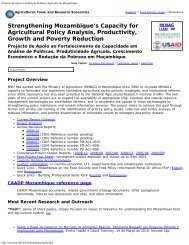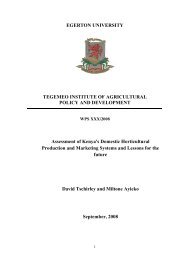Mozambique CAADP - Department of Agricultural Economics ...
Mozambique CAADP - Department of Agricultural Economics ...
Mozambique CAADP - Department of Agricultural Economics ...
Create successful ePaper yourself
Turn your PDF publications into a flip-book with our unique Google optimized e-Paper software.
2. Objective 1: To assist MINAG in building institutional capacity to raise smallholder<br />
productivity and income through improved technology, markets and policies<br />
2.1. <strong>CAADP</strong><br />
The <strong>CAADP</strong> process was <strong>of</strong>ficially launched in <strong>Mozambique</strong> on December 13, 2010 by the Prime<br />
Minister <strong>of</strong> <strong>Mozambique</strong>. The launching ceremony was attended by the Minister <strong>of</strong> Agriculture, Vice<br />
Minister <strong>of</strong> Finance, senior <strong>of</strong>ficials from various sector ministries, key development partners<br />
supporting the agricultural sector, farmer organizations, non-governmental organizations, universities,<br />
NEPAD, SADC, and others. The Prime Minister recognized that agricultural sector performance is<br />
still unsatisfactory and that <strong>Mozambique</strong> is behind in fulfilling its commitment to increase public<br />
expenditure in agriculture to at least 10% <strong>of</strong> total public expenditure. He reiterated the government’s<br />
commitment to achieve this budget target within the current mandate. He also emphasize the<br />
government’s commitment to the <strong>CAADP</strong> process and the need to honor the timeline proposed for the<br />
signing <strong>of</strong> the Compact in April 2011, although that calendar has since been pushed back<br />
substantially. The representative <strong>of</strong> development partners supporting agriculture emphasized the<br />
urgency <strong>of</strong> concluding and gaining approval for the PEDSA, as it provides the base for the <strong>CAADP</strong><br />
process. With the end <strong>of</strong> ProAgri II, PEDSA and <strong>CAADP</strong> are needed to provide donors with<br />
guidance on government priorities and actions for the medium term.<br />
The <strong>CAADP</strong> Country Team benefited from two trainings in FY2011, with strong MSU/IFPRI<br />
collaboration working with the consultant hired by MozSAKSS. The training was intended to build<br />
the capacity <strong>of</strong> the team in the implementation <strong>of</strong> the <strong>CAADP</strong> process. The training was divided into<br />
two separate sessions: session one familiarized the team members with PEDSA and the rationale<br />
behind the <strong>CAADP</strong> process, while session two dealt with issues <strong>of</strong> implementation <strong>of</strong> the <strong>CAADP</strong><br />
process. Gilead Mlay prepared the program for session I and together with Helder Gemo <strong>of</strong> Moz-<br />
SAKSS oriented the session on the <strong>CAADP</strong> framework. Director Victorino Xavier presented the<br />
PEDSA. The Ministry <strong>of</strong> Health was brought into the process through the participation <strong>of</strong> a MISAU<br />
nutritionist as a member <strong>of</strong> the <strong>CAADP</strong> Country Team.<br />
At the request <strong>of</strong> MINAG, MSU’s Cynthia Donovan began to populate a <strong>Mozambique</strong> <strong>CAADP</strong><br />
website with government strategies, <strong>CAADP</strong> documents from <strong>Mozambique</strong> and elsewhere, links to<br />
important sites, and a limited number <strong>of</strong> relevant research reports. More information can be found on<br />
the MSU-based <strong>Mozambique</strong> <strong>CAADP</strong> website.<br />
MSU contributed to the development and refining <strong>of</strong> the roadmap for the <strong>CAADP</strong> process as the year<br />
progressed. In mid-year, as an input to the <strong>CAADP</strong> process and contribution <strong>of</strong> empirical evidence,<br />
MSU, IFPRI, and MozSAKSS sponsored the <strong>Mozambique</strong> Diálogo sobre Promoção de Crescimento<br />
Agrário em Moçambique (Dialogue for the Promotion <strong>of</strong> Agrarian Growth in <strong>Mozambique</strong>), held July<br />
21, 2011 in Maputo. This major outreach generated a large turn-out from the public, private, and civil<br />
society sectors (See Outreach section below).<br />
2.2. Agriculture/nutrition linkages and gender<br />
Dr. Kim Chung, MSU Faculty member, with Jaquelino Massingue and Cynthia Donovan, met<br />
extensively with Ministry <strong>of</strong> Health, Ministry <strong>of</strong> Agriculture, SETSAN, various UN agencies, nongovernmental<br />
organizations and others during travel to <strong>Mozambique</strong> by Dr. Chung. She worked with<br />
the local MSU team to identify opportunities for research and policy recommendations. Her trip<br />
report was developed into a working paper (available in FY2012).<br />
Massingue and Donovan continued to participate in <strong>CAADP</strong> Country Team meetings and other<br />
discussions, helping inform stakeholders <strong>of</strong> the role <strong>of</strong> Pillar 3 in the <strong>CAADP</strong> process and the<br />
importance <strong>of</strong> linking agriculture and nutrition to sustainably improve household food security. The<br />
Multisectoral Plan to Reduce Chronic Malnutrition is seen as a key inter-ministerial and interorganizational<br />
effort that incorporates activities linking agriculture and nutrition. Later in FY2011,<br />
2


